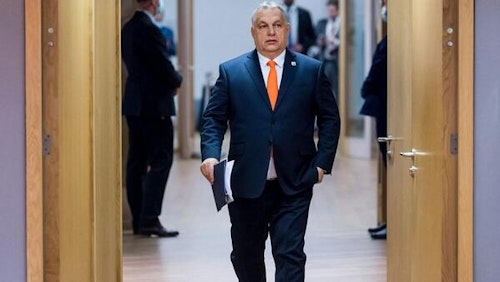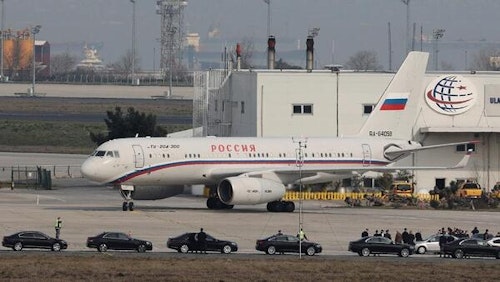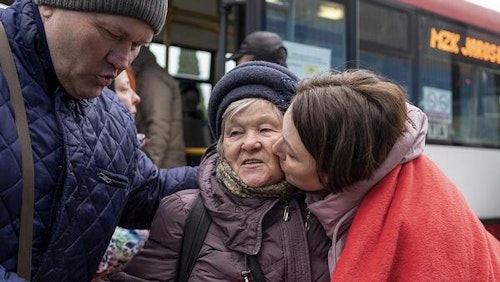At peace talks in Instanbul, Russia said it will "fundamentally" reduce combat operations around Kyiv and Chernihiv. Ukraine has said it will accept neutral status in return for security guarantees.
With Russia's war in Ukraine into its second month, there has been movement at peace talks in Turkey.
As Moscow's military offensive stalls in the face of strong Ukrainian resistance, Putin's forces have been continuing to pound targets from afar.
Planned humanitarian corridors to evacuate besieged and terrorised civilians have faltered. Millions of people have fled their homes, while thousands of civilians and military personnel have been killed in the fighting, which has left widespread devastation.
This article dates from Tuesday. For Wednesday's latest updates click here.
See a summary of Tuesday's developments in our blog below, and watch the report in the video player above.

 ${title}
${title}
Live ended
Tuesday key points to know:
- Russia will scale back its military operations in Kyiv and Chernihiv, say Russian negotiators, amid a switch to focus on Donbas in eastern Ukraine.
- Ukraine wants an international agreement that would see several countries guarantee its security.
- Turkey hailed the developments in Istanbul as "meaningful progress" as Ukraine and Russia held a new round of peace talks.
- Washington struck a note of caution, US Secretary of State Antony Blinken warning "there is what Russia says, and there is what Russia does". The leaders of the US, UK, Germany and Italy warned against any "slackening of Western resolve".
- At least seven people were killed and 22 others wounded in a Russian strike on the southern city of Mykolaiv, which hit the regional government headquarters.
- Four EU countries expelled a total of dozens of Russian envoys amid security fears.
- Russia planning to deploy 1,000 Wagner mercenaries to eastern Ukraine, says the UK's MoD.
- Russian Oligarch Roman Abramovich -- who along with two Ukrainian peace negotiators was allegedly the victims of a suspected poisoning at previous negotiations earlier in March -- was seen at Tuesday's talks.
- Ukraine reopened "humanitarian corridors" on Tuesday, having suspended them the previous day for fear that Russia may attack evacuated civilians.
Russia and Belarus 'not welcome' at Nazi concentration camp memorial
Russian and Belarusian representatives have not been invited to an upcoming memorial ceremony at a former Nazi concentartion camp.
The memorial foundation at Buchenwald said that officials from Russia and Belarus were “not welcome” at next month’s event.
The foundation said that the commemoration had been tarnished by Russia’s invasion of Ukraine and the “violent death” of Boris Romantschenko – a former Buchenwald prisoner who was killed by a Russian airstrike on Kharkiv earlier this month.
The 96-year-old was also vice-president of the International Buchenwald-Dora Committee for Ukraine.
The memorial on April 10 will mark the 77th anniversary of the liberation of the former Nazi camp and will also pay tribute to Romantschenko.
Poland becomes first EU country to block coal imports from Russia
Poland’s government has decided to block imports of coal from Russia as part of an overarching strategy to reduce its energy dependence.
Government spokesperson Piotr Mueller said the EU country would be the first to impose financial penalties on any private companies that import Russian coal into Poland.
Polish customs officials will also be carrying out checks as part of the new policy, he added.
“We cannot continue to wait for the European Union's reaction in this regard,” Mueller said on Tuesday.
Warsaw has been in favour of strengthening sanctions against Moscow following the invasion of Ukraine, including a ban on fuel imports.
Ukraine-Russia talks: 'We'll see,' says Biden
President Joe Biden says he's waiting to see how Russia adjusts its troop presence in Ukraine before assessing the intent behind them.
Speaking to reporters at the White House, Biden was asked whether the withdrawal was a sign that negotiations to rein in the month-long invasion might be showing progress, or an indication that Russia was merely trying to buy time to continue its assault on Ukraine.
"We'll see," he said. "I don't read anything into it until I see what their actions are."
As for the negotiations between Russia and Ukraine, Biden said the consensus of Western allies is to "see what they have to offer."
(AP)
Cautious reaction to Ukraine-Russia talks from Western leaders
The American, French, British, German and Italian leaders were cautious after the announcement of these advances in the Russian-Ukrainian talks.
Joe Biden, Emmanuel Macron, Boris Johnson, Olaf Scholz and Mario Draghi warned in a telephone conversation against any "slackening of Western resolve until the horror inflicted on Ukraine is over", according to Downing Street.
They said they agreed to "continue to increase the cost paid by Russia", according to the White House.
European stock markets have returned to optimism by ending up sharply.
Ukraine's nuclear power plants in 'unprecedented danger' — IAEA
International Atomic Energy Agency chief Rafael Mariano Grossi says the conflict is "putting Ukraine's nuclear power plants and other facilities with radioactive material in unprecedented danger".
Full story here:
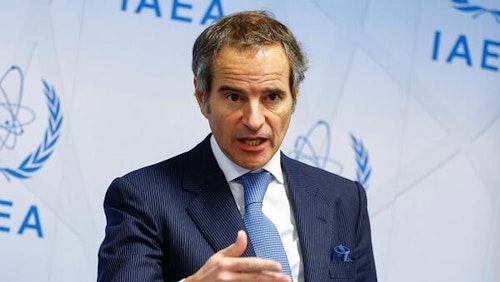
Ukraine's nuclear power plants in 'unprecedented danger'
euronews "We must take urgent action [...] to reduce the risk of a nuclear accident that could have a severe health and environmental impact both in Ukraine and beyond."Visegrad defence ministers' meeting cancelled over Hungary's stance on Russia
Poland and the Czech Republic decided not to attend due to Budapest's stance on Russia's invasion of Ukraine.
Full story here:
Ukraine urges countries to ban 'Z' symbol
Ukraine's foreign affairs minister urged countries to ban the 'Z' symbol which has been adopted by some in Russia as a symbol of support for what the Kremlin describes as a “special military operation.”
"I call on all states to criminalise the use of the ‘Z’ symbol as a way to publicly support Russia’s war of aggression against Ukraine," said foreign affairs minister Dmytro Kuleba.
"’Z’ means Russian war crimes, bombed out cities, thousands of murdered Ukrainians. Public support of this barbarism must be forbidden."
Lithuanian lawmakers are currently debating a ban on use of the symbol, with people who violate it facing a fine of up to €500.
German authorities have also been considering whether to prosecute people who use the Z symbol to show support for Russia’s invasion of Ukraine.
Read more about the pro-war Z symbol here.
US may need to add forces in Europe, general advises
The United States will likely need to add more permanent or rotational forces in Europe in the wake of the Russian invasion of Ukraine, the US European Command leader told Congress on Tuesday, without detailing when or how many.
General Tod Wolters, who also serves as NATO’s supreme allied commander, said decisions will be based on what European nations do, particularly in response to the need to build four additional NATO battlegroups which are being set up in Hungary, Slovakia, Romania and Bulgaria.
The groups are an effort to protect and reassure nations on Europe’s eastern flank.
“My suspicion is we’re going to still need more,” Wolters told the Senate Armed Services Committee.
(AP)
Russian delegate says talks show progress
The head of the Russian delegation in talks with Ukraine says that Moscow sees the latest meeting as a step toward compromise.
Vladimir Medinskiy said on Russian RT television that Russia sees Ukrainian proposals made on Tuesday during the talks in Istanbul as a “step to meet us halfway, a clearly positive fact.”
He added that the two parties have a long way to go to reach an agreement.
He said Russia agreed to a prospective meeting between Russian President Vladimir Putin and Ukrainian President Volodymyr Zelenskyy once a prospective peace treaty is ready for signing.
The Ukrainian delegation earlier on Tuesday said it had laid out a possible framework for a future peace deal based on legally binding security guarantees that would provide for other countries to intervene if Ukraine is attacked.
(AP)
Netherlands and Czech Republic expel Russian diplomats
The Netherlands and the Czech Republic have followed Belgium and Ireland in announcing that they are expelling Russian diplomats from their countries. READ OUR FULL STORY HERE.
The Netherlands said it was expelling 17 Russians who it described as intelligence officers masquerading as diplomats. The Czech Republic gave one Russian diplomat 72 hours to leave the country.
“Together with our allies, we are reducing the Russian intelligence presence in the EU,” the Czech Foreign Ministry said.
Belgium said it was ejecting 21 Russians, while Ireland told four senior Russian officials to leave the country because of activities deemed not “in accordance with international standards of diplomatic behaviour" (see earlier posts).
Poland last week expelled 45 Russians whom the government identified as intelligence officers using their diplomatic status as cover to operate in the country.
The Netherlands said it took its decision in consultation with “a number of like-minded countries,” citing similar expulsions by the United States, Poland, Bulgaria, Slovakia, Estonia, Latvia, Lithuania and Montenegro.
“The cabinet has decided to do this because of the threat to national security posed by this group,” the Dutch ministry said in a statement. “The intelligence threat against the Netherlands remains high. The current attitude of Russia in a broader sense makes the presence of these intelligence officers undesirable. The deportation is a measure taken in the context of national security.”
(with AP)
Russian-owned 'superyacht' seized in London
A luxury yacht with swimming pool and wine cellar belonging to a Russian national has been seized in London in retaliation for the Russian invasion of Ukraine, Britain's National Crime Agency (NCA) said on Tuesday. It's said to be the first ever seizure of such a vessel in UK waters.
The move followed some "fast-paced" intelligence work by the agency's Combating Kleptocracy Cell, its statement said. The seizure was ordered by Transport Secretary Grant Shapps once the information was passed onto him.
The minister tweeted a photo of himself posing in front of the vessel, named as Phi, and said to be worth £38 million (€45 million).
The yacht "includes what the builders call an 'infinite wine cellar' and patented fresh-water swimming pool," the NCA says.
Its Russian ownership "was deliberately well hidden", it explains. "The company the ship is registered to is based in the (tax haven) islands of St Kitts and Nevis and it carried Maltese flags to hide its origins."
The owner is not specifically targeted by UK sanctions against Russia, but UK legislation allows for the seizure of ships owned, controlled, chartered or operated by people linked to the country.
Ireland expels four Russian diplomats
Ireland has said it is expelling four Russian diplomats on the grounds that their activities are "not in accordance with international standards of diplomatic behaviour".
"This afternoon, the Department of Foreign Affairs summoned the Russian Ambassador to Iveagh House to advise him that four senior officials have been asked to leave the State," a statement said.
It added that channels of communication between Dublin and Moscow would remain open, "important in the context of conveying our strong views on the Russian Federation’s war against Ukraine, which we regard as a serious breach of international law".
Ireland is applying EU sanctions on Russia but has refused to supply lethal weapons directly to Ukraine, citing its military neutrality.
Blinken: 'There is what Russia says, and what Russia does'
The US Secretary of State Antony Blinken has said he has not seen "signs of real seriousness" from Russia in pursuing peace in Ukraine since it launched its invasion.
Speaking from Rabat in Morocco, he sounded a large note of caution amid reports of progress at the talks in Istanbul.
"I would leave it to our Ukrainian partners to characterise whether there is any genuine progress, and whether Russia is engaged, engaging meaningfully," he said.
"What I can say is this: there is what Russia says, and there is what Russia does. We're focused on the latter. And what Russia is doing is the continued brutalisation of Ukraine and its people, and that continues as we speak."
Belgium expels 21 Russian diplomats for spying
Belgium has decided to expel 21 people working for the Russian embassy and consulate due to their "involvement in espionage and influence operations threatening national security", Foreign Minister Sophie Wilmès said on Tuesday.
The minister published the statement on her Twitter account shortly after makng an announcement to a parliamentary committee, adding that those concerned must leave Belgian territory within 15 days.
Orthodox Patriarch denounces 'horrific invasion'
The spiritual leader of the world's Orthodox Christians, Ecumenical Patriarch Bartholomew, met Ukrainian refugees in Warsaw on Tuesday to show them his solidarity and denounce the aggression against their country.
Without mentioning Russia by name, he described as "unimaginable" the destruction caused "by this horrific invasion, in the Ukrainian nation and in the whole world", in a speech at the Stefan Wyszynski Catholic University,
Patriarch Bartholomew is in Poland at the invitation of President Andrzej Duda, whom he met on Monday. Upon his arrival he denounced the war in Ukraine as "unjust" and "unfounded".
"If any war deserves condemnation, a war between Orthodox is absolutely unacceptable," said the 82-year-old religious leader who came to an Orthodox church in Warsaw to pray for peace, before deploring "the crisis of unity" Orthodox Christians are currently experiencing.
In Ukraine, the majority Orthodox population is divided between the faithful of the Russian Orthodox Church and a new independent church based in Kyiv.
Patriarch Bartholomew formally recognised the new church's independence in 2019, which provoked a violent reaction from the Moscow hierarchy, which severed all its links with Constantinople. Patriarch Kirill, the leader of the Russian Church and longtime Putin supporter, has backed the Russian invasion of Ukraine.
(with AFP, AP)
Biden to speak on phone to several European leaders
US President Joe Biden will speak to European leaders on Tuesday about the war in Ukraine, the White House has announced.
The phone call, scheduled for Tuesday morning EDT, Tuesday afternoon CET, with the French, British, German and Italian leaders, aims to "discuss the latest developments regarding the Russian invasion of Ukraine", said a spokesperson.
Russian attacks continue despite talks
Even as the negotiators assembled in Istanbul, Russian forces hit an oil depot in western Ukraine and demolished a government building in the south, with several deaths.
A missile struck the oil depot late Monday, the second attack on oil facilities in a region that has been spared the worst of the fighting. On Tuesday morning, an explosion blasted a hole in a nine-story administration building in Mykolaiv, a southern port city that Russia has unsuccessfully tried to capture.
Seven people died in the missile attack and 22 were wounded, Zelenskyy said in an address to Danish lawmakers.
“It’s terrible. They waited for people to go to work” before striking the building, said regional governor Vitaliy Kim. “I overslept. I’m lucky.”
(AP)
18 million will need humanitarian aid — IFRC
The head of the International Federation of Red Cross and Red Crescent Societies says an estimated 18 million people in Ukraine will need humanitarian aid amid the devastation and displacement after Russia’s invasion.
IFRC president Francesco Rocca says the Ukrainian Red Cross has reached 400,000 people with items like food, bedding, blankets, tents and water since the invasion on Feb. 24. Ukraine’s pre-war population was 44 million.
He told reporters at a U.N. briefing in Geneva Tuesday that “no one in Ukraine is left unscathed by the ongoing conflict.”
At the same briefing, spokesman Ewan Watson of the International Committee of the Red Cross – a sister organization which focuses on conflict and the rules of war -- said “time is running out” for civilians in Mariupol and other frontline areas that have recently been unable to receive humanitarian aid.
The World Health Organization representative in Ukraine, Dr. Jarno Habicht said the U.N. health agency has tallied 74 attacks on health care – including medical facilities, ambulances and health workers – that have killed 72 people so far in the conflict.
(AP)
'Most meaningful progress' since start of peace talks
Here's our write-up of today's developments in Istanbul at the face-to-face negotiations between Russian and Ukrainian delegations:
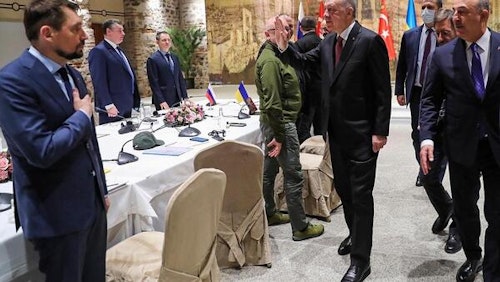
Ukraine-Russia peace talks make 'most meaningful progress' yet
euronewsThe progress made seems to have shifted the needle on a possible meeting between Volodymyr Zelenskyy and Vladimir Putin.Turkey sees 'meaningful progress' in talks
Turkey's foreign minister says Russian and Ukrainian negotiators have reached “a consensus and common understanding” on some issues.
Mevlut Cavusoglu said the two sides made “the most meaningful progress” since the start of the negotiations at a meeting in Istanbul on Tuesday. He said the meeting would be followed by a meeting between the Russian and Ukrainian foreign ministers.
Cavusoglu said a meeting between the Russian and Ukrainian leaders was also “on the agenda,” he said. He didn't give a timeframe.
He said that difficult issues “will be taken up at a higher level.”
Cavusoglu added that Turkey encouraged the two sides to “secure a cease-fire” and an agreement on the issue of the opening of humanitarian corridors.
(AP)
Ukraine calls for 'international agreement' to guarantee security
Ukraine wants an "international agreement" to guarantee its security, with potentially several countries signing up to be guarantors.
After several hours of talks in Istanbul on Tuesday, Ukraine's chief negotiator David Arakhamia said "we insiste that it is an international agreement which will be signed by all the guarantors of security."
"We want an international mechanism of security guarantees where the guarantor countries will act in a similar way to Article 5 of NATO and even more firmly," he added.
Article 5 of the Atlantic Alliance treaty stipulates that an attack against one of its members is an attack against all.
Among the countries that Ukraine would like to have as guarantors, Arakhamia cited the United States, China, France and the United Kingdom - members of the UN Security Council - but also Turkey, the Germany, Poland and Israel.
"Ukraine will accept a neutral status if the security guarantee system works," he added.
With such guarantees, Ukraine "will not deploy on (its) territory any foreign military base" and will not join "any military-political alliance," said another negotiator, Oleksandr Chaly.
Military exercises could nevertheless be organised in Ukraine with the agreement of the guarantor countries, he specified.
Kyiv also says any international agreement should not in any way prohibit Ukraine's entry into the EU, and argues that guarantor countries undertake to contribute to this process.
In order for these guarantees to take effect as soon as possible, Crimea and the Donbas territories under the control of pro-Russian separatists would be "temporarily excluded" from the agreement, Arakhamia said.
To resolve the specific issue of Crimea, annexed by Russia in 2014, Kyiv is proposing "15 years" of separate Russian-Ukrainian talks, according to another Ukrainian negotiator, Mykhailo Podolyak.
(AFP)
Putin-Zelenskyy meeting 'could be multilateral with guarantor states' — Russian delegate
More on the talks in Istanbul where Russia has said it will drastically reduce its military activity in the areas around Kyiv and Chernihiv.
The head of the Russian delegation and Kremlin representative Vladimir Medinski reported "substantial discussions" and said Ukraine's "clear" proposals for an agreement would be "studied very soon and submitted to the President", Vladimir Putin.
According to him, a meeting with Putin's Ukrainian counterpart Volodymyr Zelensky, and guarantor states, would be possible in the event of an agreement to end hostilities.
"As regards a meeting of the two presidents, we have said from the start that it will be possible when there is an agreement (...) The meeting could be multilateral, with the participation of guarantor states," he said.
"After today's substantial discussion, we have agreed and propose that the meeting be held to initial the agreement," he said.
"Provided that we work quickly on the agreement, and find the necessary compromises, the possibility of concluding peace will come closer," Medinski said.
Russia's military campaign around Kyiv has stalled, with Ukrainian forces counter-attacking and regaining some territory. Last week Russia's army chief said the military effort would concentrate on the Donbas region in eastern Ukraine from now on.
(with AFP)
"Sufficient" conditions for Zelenskyy-Putin meeting
The conditions for a first meeting between Ukrainian President Volodymyr Zelensky and his Russian counterpart Vladimir Putin since the beginning of the Russian invasion on February 24, are now "sufficient".
Ukraine's Chief Negotiator David Arakhamia made the comments after a new session of Russian-Ukrainian talks which began on Tuesday morning in Istanbul, under the auspices of President Erdogan.
"The results of today's meeting (in Istanbul) are sufficient for a meeting at the level of heads of state" said Arakhamia.
Since the beginning of the conflict, Moscow has refused any similar proposals from Kyiv.
Russia to scale back military operations in Kyiv and Chernihiv
Russia will drastically reduce its military activity in the areas around Kyiv and Chernihiv in Ukraine, after "substantial" Russian-Ukrainian talks in Istanbul, Russian negotiators said on Tuesday.
"As the negotiations on an agreement on the neutrality and non-nuclear status of Ukraine entering a practical dimension (...), it was decided, in order to increase confidence, to drastically reduce military activity in the direction of Kiev and Chernihiv," Russian Deputy Defense Minister Alexander Fomin said in Istanbul.
The head of the Russian delegation, Vladimir Medinski, reported "substantial discussions" between the two sides which met in Turkey under the auspices of President Erdogan.
Russian attacks on Mariupol "a crime against humanity", says Zelenskyy
Russian attacks against Mariupol are a "crime against humanity" says Ukrainian President Volodymyr Zelenskyy.
He made the comments in a live video address to the Danish parliament in Copenhagen, as a new round of negotiations between Russia and Ukraine got underway in Istanbul.
The southern port city of Mariupol has been under siege for weeks, and tens of thousands of residents are thought to be still trapped there, unable to leave and facing daily bombardment from Russian forces. Ukrainian authorities estimate that at least 5,000 civilians have been killed in the city.
"What the Russian troops are doing in Mariupol is a crime against humanity, which is taking place live before the eyes of the planet," Zelenskyy told Danish MPs, accusing Moscow of deliberately bombing civilian shelters in Mariupol.
"They even blow up shelters when they know full well that civilians are hiding there, women, children and old people" he said.
Russian minister stresses that military focus is on Donbas region
Russia’s defence minister says that “liberating" the Donbas region in eastern Ukraine is the main goal of Moscow’s military operation, underlining a possible shift in strategy announced last week by another Russian military official.
Defence Minister Sergei Shoigu, whose few public appearances this month raised questions about his health and whereabouts, held a meeting with top military officials on Tuesday and said that “overall, the main tasks of the first stage of the operation have been completed.”
He said that “the combat potential of the Ukrainian armed forces has been significantly reduced, which makes it possible to focus the main attention and main efforts on achieving the main goal -- the liberation of Donbas.”
The minister stressed that the Russian military will continue the operation until “the set goals are achieved.”
Shoigu also offered an assurance that Russia will not send conscripts recruited in the upcoming April draft to Ukraine. Earlier this month, the Russian military admitted that a number of conscripts ended up in Ukraine and were even captured there.
Macron and Putin to talk on the telephone
France's president, Emmanuel Macron, will speak again on the telephone with his Russian counterpart Vladimir Putin, Macron's office announced on Tuesday.
The call will take place at 16:30 CEST.
Among the war issues on the agenda is the possibility of a humanitarian evacuation operation in the besieged Ukrainian city of Mariupol, said the Elysee.
Macron wants to launch the operation in the coming days, accusing Moscow of not respecting international humanitarian law.
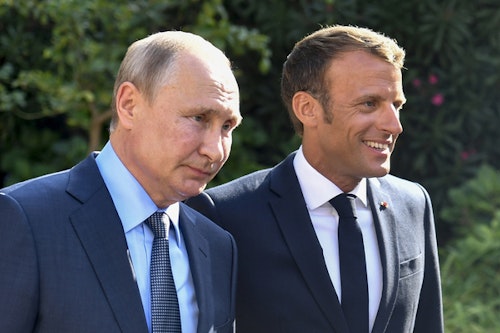
Talks with Russia focus on security guarantees, Ukraine says
An adviser to Ukrainian President Volodymyr Zelenskyy says the talks under way with Russia in Istanbul are focusing on security guarantees for Ukraine and hopes of a cease-fire.
Mykhailo Podolyak told Ukrainian media on Tuesday that there are “intensive consultations going on regarding several important issues, the key among those is an agreement on international security guarantees for Ukraine."
He said that "only with this agreement can we end the war in a way that Ukraine needs.”
He adds that “the second block of issues is a cease-fire so that we could resolve all the humanitarian problems which have piled up and which require urgent resolutions.”
Podolyak added the two sides were also discussing breaches of the rules of war.
(AP)
Lithuania debating a ban on Russia Z symbol
Lawmakers in Lithuania are debating a ban on using the ‘Z’ symbol to show support for Russia’s attack on Ukraine.
Russian troops in Ukraine have painted the letter Z on the side of vehicles and it has been adopted by some in Russia as a symbol of support for what the Kremlin describes as a “special military operation.”
Lithuania, which already has outlawed Soviet and Nazi symbols, also wants to ban the black-and-orange ribbon that was originally a military decoration is now used as a of remembrance of the Soviet victory over Nazi Germany.
Lawmaker Monika Osmianskiene said the symbols “are becoming a symbol not only of propaganda but also of aggression.
A vote in Lithuania’s parliament is expected this week. If it passes, people who violate a ban could face a fine of up to €500.
(AP)
Ukrainian city of Mykolayiv hit by a Russian strike
At least seven people are dead and 22 others wounded in a Russian strike on the city of Mykolayev.
The increase in casualty figures came from President Zelenskyy as he spoke live to the Danish parliament in Copenhagen.
The strike partially destroyed the regional administration building in Mykolayiv, which is near Odesa in the south of the country.
Two bodies were initially pulled from the building, and Regional Governor Vitaly Kim said on Facebook that rescuers were looking for "eight civilians and three soldiers" under the rubble. He said most of those inside at the time of the strike were unharmed.
Mr Kim said that "half of the building was destroyed" and his office was affected.
(AFP)
Watch: Turkish President Erdogan opens Istanbul peace talks
Turkish President Erdogan has given an address to delegates from Russia and Ukraine who are meeting in Istanbul today for another round of peace talks.
Erdogan urged them to establish a ceasefire as soon as possible, and said negotiators had an "historic responsibility" to bring peace to the conflict, which is already in its second month.
Watch the video here:
Ukraine: Humanitarian corridors open again to evacuate civilians
Ukraine's government says they'll resume the evacuation of civilians from three humanitarian corridors, a day after the evacuations were halted due to security concerns, with authorities saying they were fearful of Russian "provocations."
"Three humanitarian corridors have been validated for today," Ukrainian Deputy Prime Minister Iryna Vereshchuk said in a video posted on Telegram.
Tens of thousands of people are still trapped in Mariupol in particular. Ukrainian officials estimate 5,000 civilian casualties in the besieged southern port city which has come under intense Russian bombardment for several weeks.
While thousands of people have managed to get out of Mariupol -- and other cities -- in convoys of buses and cars, Ukraine's government was concerned enough that Russia might attack fleeing civilians on Monday that it suspended the humanitarian corridors.
British assessment: Ukrainian troops are making some progress, but Russian forces are regrouping
A new assessment of the state of the war in Ukraine released Tuesday morning highlights how Ukrainian troops have been able to make modest gains, while the Russians have been regrouping their forces.
The Ministry of Defence report says the Ukrainians have made counter strikes against Russians in Irpen, Bucha and Hostomel and that Russian forces have been pushed back. However it also notes that Russians are "maintaining blocking positions" as they try to reorganise and reset their forces.
Read more in this Twitter thread:
Erdogan: Russia and Ukraine both have "legitimate concerns" as Istanbul talks get underway
Negotiators from Russia and Ukraine are in Turkey today for the latest round of peace talks.
They were welcomed to the Dolmabahçe Palace in Istanbul on Tuesday morning by Turkish President Recep Tayyip Erdogan who said both Ukraine and Russia have "legitimate concerns" and called on them to "put an end to this tragedy."
Read more in our story here:
How past horrors are pushing Polish Jews to help fleeing Ukrainians
Poland, which shares a long border with Ukraine, has taken the brunt of the refugees fleeing Russia's invasion of their southern neighbour.
Among those mobilising to help is Poland's Jewish community.
With a not-so-distant history of being both displaced and seeking refuge, Jewish people in Poland are acutely aware of what it is like to be in Ukrainians' shoes.
Read more in our story here:
Aid chief: Don't cut funding for poor countries, to help Ukraine
The head of the Norwegian Refugee Council Jan Egeland is warning Western countries not to be tempted to cut their aid budgets for the world's poorest countries, as they rush to help Ukraine.
"Never in my 40 years of humanitarian work have I seen three million people displaced by war and conflict every week for a month," Jan Egeland, secretary general of the Norwegian Refugee Council, told the AFP news agency
Since the beginning of the Russian invasion, more than 10 million Ukrainians -- a quarter of the population -- have become displaced.
Nearly 3.9 million have even fled the country to find refuge in neighboring states, although this flow has slowed significantly in recent days.
Poland alone hosts more than half of the Ukrainians who have fled their country, but Romania, Moldova, one of the poorest countries on the continent, and Hungary and Slovakia have also received several hundred thousand refugees each
Egeland says the European response to the crisis "has so far been very good in relation to the needs" raising $1.5 billion for a UN appeal which launched on 1 March. But he notes that the crisis in Yemen involved more people, who were even poorer, and the appeal raised less than half the amount that Ukraine raised.
"There is no doubt that a war in Europe is horrible news for the populations of the Sahel" says Egeland.
"Everything has become more expensive, wheat from Russia and Ukraine could now fail them, prices are skyrocketing, fuel is more expensive, our [humanitarian] activities are more expensive -- all this while some donors are redirecting their aid from very poor countries to Europe."
Joe Biden 'makes no apologies' over Vladimir Putin comments
US President Joe Biden said he would make “no apologies” and wasn't “walking anything back” after his weekend comment that Russian President Vladimir Putin “cannot remain in power."
He made the comments late Monday evening in an attempt to turn the page on a controversy that clouded his recent trip to Europe -- with many people interpreting his comments as a call for regime change in Moscow, something the White House has rushed to explain is not the case.
“I was expressing the moral outrage that I felt toward this man,” Biden said. "I wasn't articulating a policy change."
The president's jarring remark about Putin, which were apparently made unscripted, came at the end of a Saturday speech in Warsaw. The speech was intended to rally democracies for a long global struggle against autocracy but drew criticism in the United States and rattled some allies in Western Europe.
On Monday evening, Biden rejected the idea that his comment could escalate tensions over the war in Ukraine or that it would fuel Russian propaganda about Western aggression.
“Nobody believes ... I was talking about taking down Putin," Biden said, adding that “the last thing I want to do is engage in a land war or a nuclear war with Russia.”
Biden said he was expressing an “aspiration" rather than a goal of American foreign policy.
New peace talks begin, but expectations muted
New talks between Russia and Ukraine are due to begin on Tuesday in Istanbul, to try and bring an end to the war which is now in its second month.
The talks come as Russia says it wants to refocus its invasion efforts to consolidate ground held in the east of the country, in the predominantly Russian-speaking Donbas region. However Ukrainian forces have started to regain ground in several key towns.
The Russian negotiators arrived on Monday in Istanbul, where a previous round of talks took place on 10 March at foreign minister level but failed to produce any progress. The talks then continued by video conference.
One of the important points of the negotiations is "security guarantees and neutrality, the nuclear-free status of our state", Ukrainian President Volodymyr Zelensky told Russian media on Sunday.
This point "is being studied in depth" but it will require a referendum and security guarantees, he warned, accusing his Russian counterpart Vladimir Putin and his entourage of "dragging things out".
Kremlin spokesman Dmitry Peskov, however, tempered expectations on Monday, pointing to the lack of "significant progress" in the negotiations so far.
Ukrainian Foreign Minister Dmytro Kouleba later said on his ministry's website that Zelensky had "given very clear instructions to our delegation. We do not bargain for people, territory or sovereignty".












